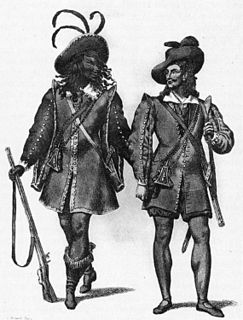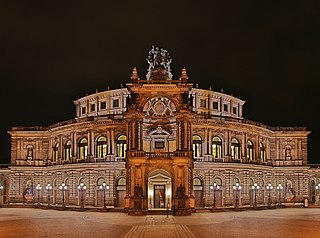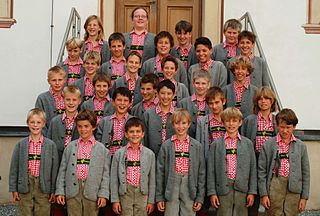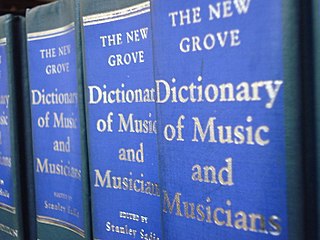
Der Freischütz, Op. 77, J. 277, is a German opera with spoken dialogue in three acts by Carl Maria von Weber with a libretto by Friedrich Kind. It premiered on 18 June 1821 at the Schauspielhaus Berlin. It is considered the first important German Romantic opera, especially in its national identity and stark emotionality.

Der Zigeunerprimas is a three-act operetta, which was composed by Emmerich Kálmán. The libretto was written by Julius Wilhelm and Fritz Grünbaum. It premiered in Vienna, at the Johann Strauss Theatre, on 11 October 1912.
Kurt Böhme was a German bass.
A ghost character, in the bibliographic or scholarly study of texts of dramatic literature, is a term for an inadvertent error committed by the playwright in the act of writing. It is a character who is mentioned as appearing on stage, but who does not do anything, and who seems to have no purpose. As Kristian Smidt put it, they are characters that are "introduced in stage directions or briefly mentioned in dialogue who have no speaking parts and do not otherwise manifest their presence". It is generally interpreted as an author's mistake, indicative of an unresolved revision to the text. If the character was intended to appear and say nothing, it is assumed this would be made clear in the playscript.

L'arbore di Diana, is an opera in two acts composed by Vicente Martín y Soler, with an original libretto by Lorenzo da Ponte. It premiered at the Burgtheater in Vienna on 1 October 1787.

A Village Romeo and Juliet is an opera by Frederick Delius, the fourth of his six operas. The composer himself, with his wife Jelka, wrote the English-language libretto based on the short story Romeo und Julia auf dem Dorfe by the Swiss author Gottfried Keller. The first performance was at the Komische Oper Berlin on 21 February 1907, as Romeo und Julia auf dem Dorfe. Thomas Beecham conducted the British premiere at the Royal Opera House, Covent Garden in London on 22 February 1910. The US premiere was on 26 April 1972 in Washington, D.C.

Lear is an opera in two parts with music by the German composer Aribert Reimann, and a libretto by Claus H. Henneberg, based on Shakespeare's tragedy King Lear.
Romeo and Juliet is a tragedy by William Shakespeare.

Falstaff, ossia Le tre burle is a dramma giocoso in two acts by Antonio Salieri, set to a libretto by Carlo Prospero Defranceschi after William Shakespeare's The Merry Wives of Windsor.

Der Jasager is an opera by Kurt Weill to a German libretto by Bertolt Brecht.
Der Widerspänstigen Zähmung is a German-language comic opera in four acts by the German composer Hermann Goetz. It was written between 1868 and 1872 and first performed at the National Theatre Mannheim on 11 October 1874 under the conductor Ernst Frank. The libretto, by Joseph Victor Widmann and the composer, is based on Shakespeare's The Taming of the Shrew. The style of the opera shows Goetz turning away from the musical ideas of Richard Wagner towards the classicism of Mozart. Der Widerspänstigen Zähmung was a huge success, not only in Germany but in the United States and in Great Britain, where it received high praise from George Bernard Shaw.
Der Templer und die Jüdin is an opera in three acts by Heinrich Marschner. The German libretto by Wilhelm August Wohlbrück was based on a number of intermediate works based in turn on Walter Scott's Ivanhoe.

Romeo und Julie is a singspiel in three acts by composer Georg Benda. The opera has a German libretto by Friedrich Wilhelm Gotter that is based upon Christian Felix Weiße's translation of William Shakespeare's play Romeo and Juliet.

Hunyadi László is an opera in three acts by the Hungarian composer Ferenc Erkel. The libretto, by Béni Egressy, is based on a play by Lőrinc Tóth. The opera was first performed at the Pesti Nemzeti Magyar Szinház, Budapest on 27 January 1844. Hunyadi László is considered to be the first important Hungarian opera and Erkel's musical style draws on folk influences, particularly the dance known as the verbunkos.
The Perfect Fool is an opera in one act with music and libretto by the English composer Gustav Holst. Holst composed the work over the period of 1918 to 1922. The opera received its premiere at the Covent Garden Theatre, London on 14 May 1923. Holst had originally asked Clifford Bax to write the libretto, but Bax declined.

La morte di Cesare is an opera seria in three acts by Francesco Bianchi. The libretto was by Gaetano Sertor, after Shakespeare's play Julius Caesar.

Aldo Bertocci was an Italian operatic tenor who sang both comprimario and leading roles in a career spanning the late 1940s to the mid-1970s. He sang in the world premieres of nine 20th century operas, most of them in performances broadcast on the RAI, Italy's national public-service radio. His discography includes live recordings of several rarities such as Mascagni's Silvano and Leoncavallo's Zingari. Bertocci was born in Turin and from 1974 lived in Cassano Valcuvia where he died shortly before his 88th birthday.

Aladdin, Op. 43, is an opera by the Swedish composer Kurt Atterberg, to a libretto written by Bruno Hardt-Warden and Ignaz Michael Welleminsky. Two versions exist, in Swedish and German. The opera is based on the story, "Aladdin's Magic Lamp" from One Thousand and One Nights. It was first performed on 18 March 1941 at the Royal Swedish Opera, Stockholm.




















